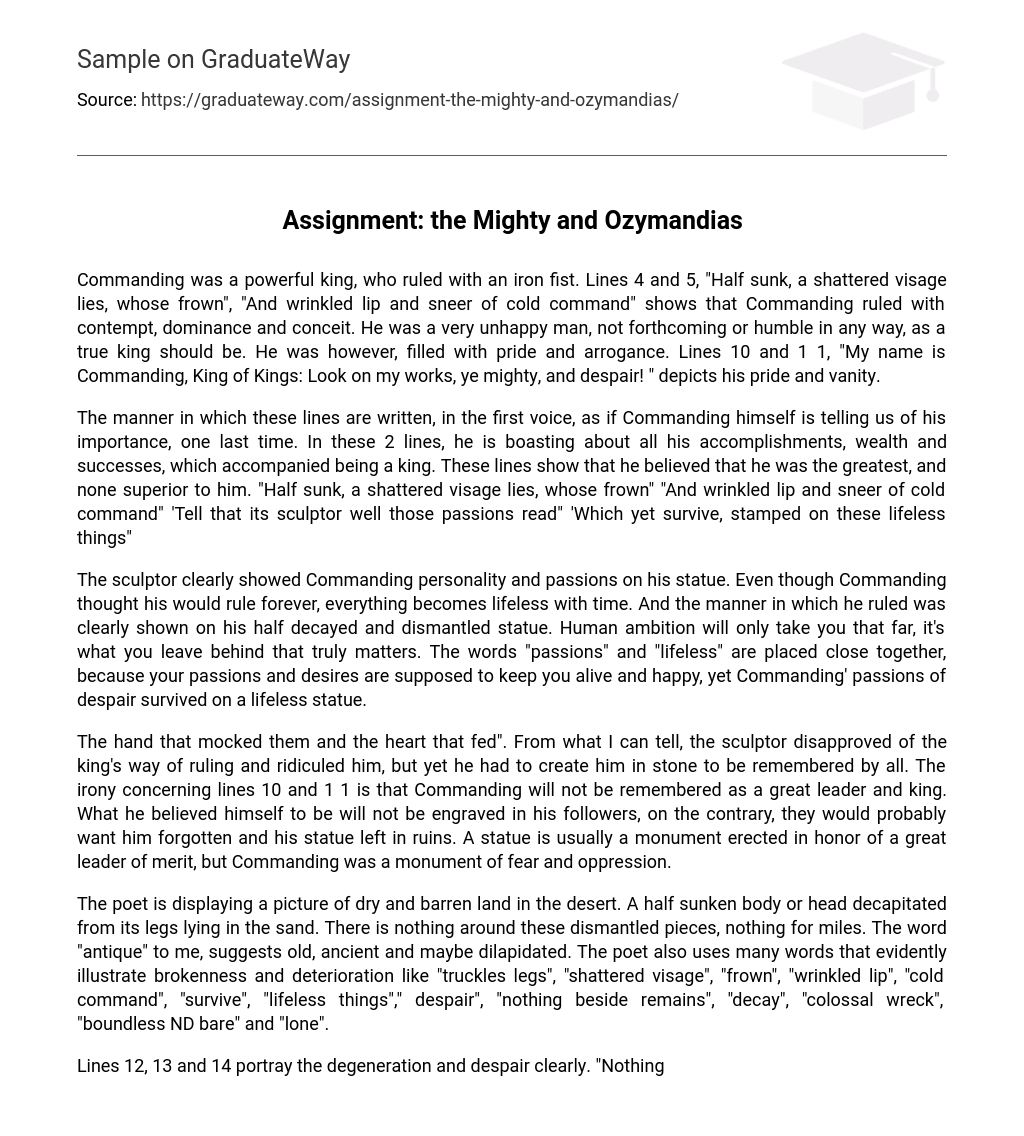Commanding was a powerful king, who ruled with an iron fist. Lines 4 and 5, “Half sunk, a shattered visage lies, whose frown”, “And wrinkled lip and sneer of cold command” shows that Commanding ruled with contempt, dominance and conceit. He was a very unhappy man, not forthcoming or humble in any way, as a true king should be. He was however, filled with pride and arrogance. Lines 10 and 1 1, “My name is Commanding, King of Kings: Look on my works, ye mighty, and despair! ” depicts his pride and vanity.
The manner in which these lines are written, in the first voice, as if Commanding himself is telling us of his importance, one last time. In these 2 lines, he is boasting about all his accomplishments, wealth and successes, which accompanied being a king. These lines show that he believed that he was the greatest, and none superior to him. “Half sunk, a shattered visage lies, whose frown” “And wrinkled lip and sneer of cold command” ‘Tell that its sculptor well those passions read” ‘Which yet survive, stamped on these lifeless things”
The sculptor clearly showed Commanding personality and passions on his statue. Even though Commanding thought his would rule forever, everything becomes lifeless with time. And the manner in which he ruled was clearly shown on his half decayed and dismantled statue. Human ambition will only take you that far, it’s what you leave behind that truly matters. The words “passions” and “lifeless” are placed close together, because your passions and desires are supposed to keep you alive and happy, yet Commanding’ passions of despair survived on a lifeless statue.
The hand that mocked them and the heart that fed”. From what I can tell, the sculptor disapproved of the king’s way of ruling and ridiculed him, but yet he had to create him in stone to be remembered by all. The irony concerning lines 10 and 1 1 is that Commanding will not be remembered as a great leader and king. What he believed himself to be will not be engraved in his followers, on the contrary, they would probably want him forgotten and his statue left in ruins. A statue is usually a monument erected in honor of a great leader of merit, but Commanding was a monument of fear and oppression.
The poet is displaying a picture of dry and barren land in the desert. A half sunken body or head decapitated from its legs lying in the sand. There is nothing around these dismantled pieces, nothing for miles. The word “antique” to me, suggests old, ancient and maybe dilapidated. The poet also uses many words that evidently illustrate brokenness and deterioration like “truckles legs”, “shattered visage”, “frown”, “wrinkled lip”, “cold command”, “survive”, “lifeless things”,” despair”, “nothing beside remains”, “decay”, “colossal wreck”, “boundless ND bare” and “lone”.
Lines 12, 13 and 14 portray the degeneration and despair clearly. “Nothing beside remains, round the decay” “Of the colossal wreck, boundless and bare” “The lone and level sands stretch far away”‘ “boundless and bare”, “lone and level” and “sands stretch” Using alliteration in these lines creates and increases the effect of what the poet is saying. It also adds emphasis on the description of the land and on what remains of the mighty Commanding. It allows a clear picture and the irony of the end of Commanding legacy.





